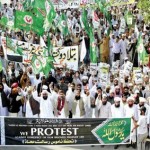Pakistan has just been through another round of ‘sit-in’ protests, led by the Barelvi group, Tehreek Labaik Ya Rasool Allah (TLY): its demand was the revocation of an allegedly blasphemous amendment in the Election Act 2017 that was perceived to be questioning the finality of the prophethood.[1] The authorities’ and the military’s reluctance to take on the protesters showed a strong possibility of collusion between the Pakistani Army and radical religious groups.
Such collusion should be seen in the context of earlier protests – by cleric Tahir ul Qadri and politician Imran Khan in 2013 and 2014 respectively. The TLY protests began in the first week of November when its cadres along with those of Tehreek-i-Khatm-i-Nabuwwat and the Sunni Tehreek Pakistan gathered in Faizabad, outside Islamabad,[2] demanding also that Law Minister Zahid Hamid resign as they held him responsible for the amendment.
The TLY[3], which has gained traction since 2015 for its anti-blasphemy stance, quickly usurped the Election Act amendment issue to corner the Pakistan Muslim League-N (PML-N) government, which is already in an embattled state after the resignation of Prime Minister Nawaz Sharif. The government, failing to clear the protesters from the streets, turned to the Army, whose mediatory role – it made the law minister resign, and asked the protesters to disperse peacefully – appeared to be a tacit attempt to undermine the credibility of civilian institutions.
Crucially, this comes at a time when the Army has made attempts to bring terrorist and religious groups into the mainstream.[4] Some of these groups have contributed to the spread of extremist ideas in Pakistan, while the Army has used others like the Lashkar-e-Taiba (LeT) and Jaish-e-Mohammed (JeM) to fight an undeclared proxy war against India. This is a direct playing out of Pakistan’s ‘good terrorist, bad terrorist strategy’: the Army has frequently cracked down on groups, such as the Pakistan Taliban (which target the security establishment), while extending kid glove treatment to the Afghan Taliban, LeT and JeM.
Taking forward the Army’s mainstreaming plan, in August 2017, the LeT announced plans to set up a political party, Milli Muslim League (MML), utilising its extensive charity network to fight the 2018 general elections.[5] Another militant group, Harkat-ul-Mujahideen, was considering doing so too.
Punjab is the province where the Army has attempted to loosen the PML-N’s grip on power, even as militant groups do their work, undeterred. The aim is to take advantage of the current situation, when every mainstream political party is knee-deep in corruption and intra-party factional politics.
The Army’s strategy has borne early, though limited, dividends. In September 2017, when by-elections for NA-120, the Lahore seat vacated by Nawaz Sharif, were held, TLY and MML managed to secure 11% of the overall vote, to finish ahead of the Pakistan Peoples Party and even the Jamaat-e-Islami, which, for years, had galvanised the extremist elements.[6]
The recent release of LeT Amir, Hafiz Saeed, seen in this context, sets the stage for the MML. Sensing the possibility of MML’s success, former military dictator, General Parvez Musharraf, has already announced his intention to join hands with the LeT for the 2018 elections.
While the international community is fully aware of Pakistan’s games, it has not exerted sustained pressure on it to make it amend its practice of using terrorist groups to achieve strategic objectives. This was evident when the U.S. Congress dropped LeT from the National Defence Authorisation Act, which in its earlier draft version, had clubbed the group with the Haqqani Network and asked Pakistan to crack down on them to be eligible for American funding.[7] The LeT was dropped because the U.S. Department of Defense did not want to push Pakistan to rescind its counter-terrorism partnership with the United States, even as the White House warned Pakistan of consequences over Hafiz Saeed’s release. This fickle approach on the part of the U.S. and a new benefactor in the form of China – through its massive investments in the China-Pakistan Economic Corridor – are emboldening the Pakistani Army to widen the role of terrorist and extremist groups in its ambit.
Sameer Patil is Fellow, National Security Studies and Director, Center for International Security, Gateway House.
This article was exclusively written for Gateway House: Indian Council on Global Relations. You can read more exclusive content here.
For interview requests with the author, or for permission to republish, please contact outreach@gatewayhouse.in.
© Copyright 2017 Gateway House: Indian Council on Global Relations. All rights reserved. Any unauthorized copying or reproduction is strictly prohibited.
References
[1] Specifically, their demand was restoration of a clause and sentence of the Khatm-i-Naboowat declaration in the Election Act 2017, which had been changed by the National Assembly of Pakistan from the phrase “I solemnly swear” with “I believe.” See National Assembly of Pakistan, Elections Act, 2017, <http://www.na.gov.pk/uploads/documents/1506961151_781.pdf>
[2] Hasan, Fawad, “Faizabad sit-in: The trail of 21 days,” The Express Tribune, 27 November 2017, <https://tribune.com.pk/story/1569778/1-faizabad-sit-trail-21-days/>
[3] Formed in 2015 by Khadim Hussain Rizvi, a preacher from Lahore, TLY came to attention for demanding stronger anti-blasphemy laws. This demand gathered momentum in 2016 after the hanging of Mumtaz Qadri, who, five years before, had killed Salmaan Taseer, then Punjab governor, who had criticised the blasphemy law. Since then TLY’s national profile has been increasing, accompanied by Rizvi’s vitriolic statements against the Ahmadis (considered non-Muslims, as per the Pakistani Constitution) and liberal-secular bloggers (who have been raising their voices against Pakistan’s growing ‘Islamicisation’).
[4] Shahzad, Asif, “Pakistan army pushed political role for militant-linked groups”, Reuters, 16 September 2017, <https://in.reuters.com/article/pakistan-politics-militants/pakistan-army-pushed-political-role-for-militant-linked-groups-idINKCN1BR02P>
[5] Associated Press, “Jamaatud Dawa enters political arena, launches Milli Muslim League party”, Dawn, 8 August 2017, <https://www.dawn.com/news/1350202>
[6] Election Commission of Pakistan, Notification no. F.8(8)/2017-Cord., 27 September 2017, <https://www.ecp.gov.pk/PrintDocument.aspx?PressId=54431&type=PDF>
[7] Congress of the United States of America, H.R.2810 – National Defense Authorization Act for Fiscal Year 2018, Sec. 1211 <https://www.congress.gov/bill/115th-congress/house-bill/2810/text>


